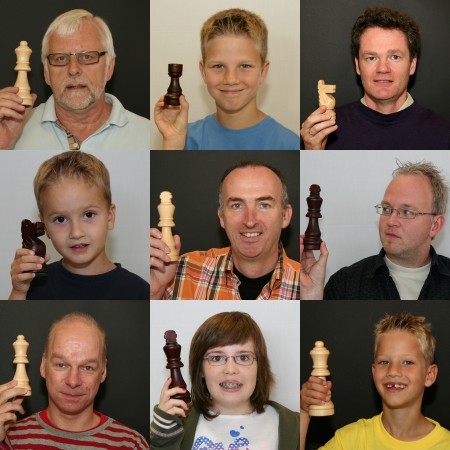I learned the rules of chess when I was 10, and started playing when I was 14. That's a bit late to become really good, but who cares? Chess is fun at any level. It is played on a square board with 8x8 squares, colored alternatingly black and white, with a black square in the left-hand corner (half of the commercials featuring a chess board get this wrong!) For those who can easily generalize from 3 to 8, and even from 9 to 64, here's an artist impression of the board:

Even though I think all 9 people in this picture are Dutch [one of them might be Belgian], 8 of them are not related to me.
I'm in square c3 or h8, depending on how you look at it [I bet you're a chess player if you thought 'h8'].
The photographer who composed this piece of art is called
Karin Gottlieb, which is funny, because one of my teachers German in middle school was called Gottlieb, which is funny, because he would let us read a story by Heinrich Böll, called "Das Nilpferd Gottlieb."
"Nilpferd" means "hippopotamus," whereas "Pferd" means "horse," and in Dutch "horse" is translated as "paard", which in turn is used to designate the "Knight" in chess, which happens to be the chess piece in my hand. Nothing is a coincidence.
I played at the following chess clubs:
- From 1979 till about 1985 I played in
Veenendaal,
the town where I was born.
After I had become club champion three times in a row, I moved to the next club, in the city where I studied physics, Utrecht.
- From '85-'91 I played at a club that used to have an ugly name
(Utstud, for "Utrecht Students"), until a famous and quite popular
Estonian chess player died in 1975 and his name was used: Paul Keres (Utrecht).
On Saturdays we played in the national club competition, and after
those rounds we played Trivial Pursuit and, inevitably, chess, in chess
cafe 't Ledig Erf.
- For just one year I played at
LSG in Leiden, so there
isn't much to say about that, you would think. But that year
a famous physicist visited the university there, and he brought his
grandson to the chessclub, a little boy with the name Alexander
Grischuk. That boy now is a Grandmaster ranked somewhere in the top 20.
Moreover, I beat Joop Piket, father of GM Jeroen Piket, but I'm not sure that really counts for anything.
- No matter how small Garching is, their chessclub
Schachclub Garching 1980 e.V.
is one of the largest in Germany. I managed to become club champion for
one year, and enjoyed playing in the Bavarian competition with my team
members.
There's even a game
from 1995 I commented on (in German!). There are several physics
institutes in Garching, and around 1994 it was their turn to organize
the sports tournament for atomic physicists, the Atomiade. One could
compete in pingpong, athletics, swimming, etc., but also, in a hidden
corner, there was a chess tournament. To my surprise I won it, ahead of
several Russians, Hungarians, French, and Germans. Afterwards, there
was a big party in a big beer tent with big sausages and big tables.
Yep, that was big fun.
- Playing in the US is different: you have to bring your own
board, pieces and clock to tournaments and there doesn't seem to exist a
competition between different club teams, except one at the highest level, between teams from Boston, San Francisco, New York, etc. Nevertheless, I can recommend
you to play chess at the
Pasadena Chess Club, where I played for three years.
-
When I got stuck in New Jersey, I every now and then went to the
Westfield Chess Club to play small tournaments. The organizer always announced me as "Vanattack."
- In Eugene, Oregon, I decided to play correspondence chess, not having found a good chess club, sadly. In domestic correspondence play in the US I'm ranked 3rd now. In international correspondence chess I don't do that well, and I'd like to blame that not just on my lack of skill and patience, but also on the fact that help from chess computers (which are indeed amazingly good these days) is allowed according to the international playing rules. Isn't that silly?
- Somewhere along the lines I managed to become a Fide Master in regular ("over the board") chess, which is an international chess title indicating you're too much of a patzer to become Grand Master.

